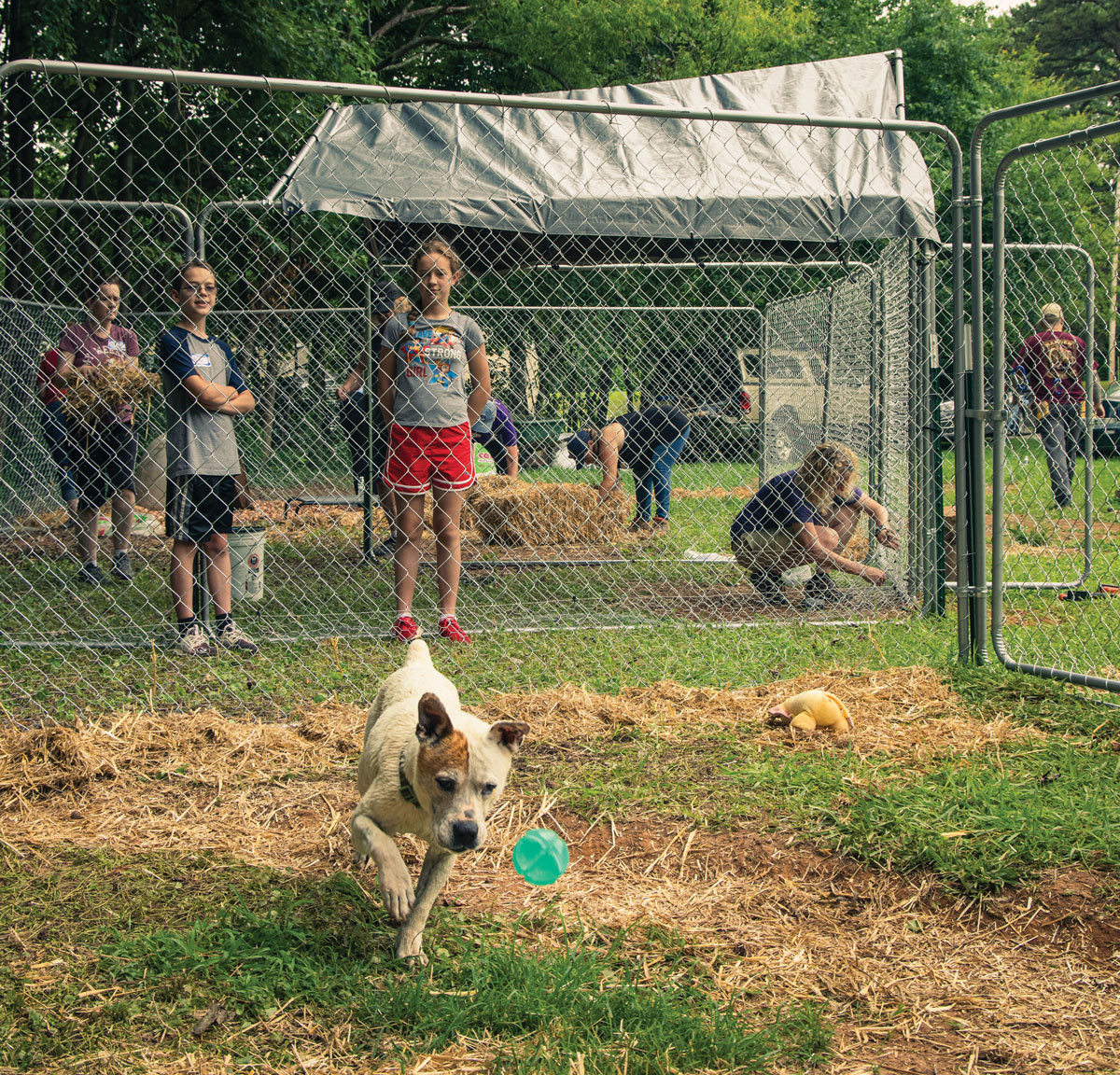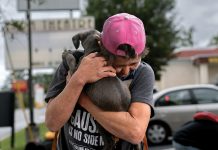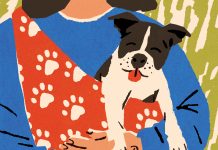
Photograph by Audra Melton
Tied up outside their Barrow County home on a sunny day in June, Porkchop and Buster barked and growled as a half dozen strangers invaded their yard. The visitors carried bales of straw, fence panels, and bundles of twine; one used a chainsaw to trim tree branches. The longer the visitors lingered, though, the more the dogs—both terrier mixes—relaxed. Maybe they sensed something good was coming.
A tethered dog is an unhappy dog for a host of reasons, not least that dogs are social animals. Tied up for long periods of time, they can become anxious and aggressive and can suffer physical ailments related to straining against their collars or being exposed to the elements. (The Humane Society says tethering is a risk factor in dog bites and attacks.) Counties and municipalities across the United States have passed laws to ban tethering. And in northeast Georgia, a nonprofit organization formed a few years ago to deal with the problem on a case-by-case basis: The group, called Off the Chain, builds fenced enclosures for dogs that need them. It was Off the Chain members busying themselves around Porkchop and Buster’s yard.
At the core of the group’s work is the conviction that a suffering dog isn’t always the victim of willful neglect or malice—sometimes a pet’s owner simply isn’t aware of the harmful side effects or doesn’t have the resources to properly provide for it. (A typical double enclosure costs about $1,800.) Besides providing fences and doghouses, Off the Chain supports antitethering ordinances; it’s advocated to get laws on the books in Gwinnett, Hall, and Barrow counties and is currently pushing for one in Jackson County. For Mike Bagwell, the guy with the chainsaw, Buster and Porkchop’s enclosure was the 52nd fence build in which he’d participated. His goal had been 50, he said: “But here I am, still doing it.”

Photograph by Audra Melton
The new digs for Buster and Porkchop marked the 85th fence build that Off the Chain had completed since forming in 2017, when Jennifer Summers met with a few friends around her dining room table in Braselton. “We all had seen individual cases” of dogs tethered and miserable, said Summers—for her, a chow chained up down the street. They decided to find a way to do something about it. Their first self-funded fence build was for a blue pitbull named Gracie.
Occasionally, their assistance goes beyond infrastructure: For Rusty, a poor elderly beagle with tumors on his neck and haunches, Off the Chain raised money through a Facebook fundraiser to pay for medical care as well as an outdoor enclosure. The group’s social-media coordinator, Lindsay Baker, showed me pictures of Rusty on her phone as we waited to begin work on the fence for Buster and Porkchop.
“You never know what to expect at a fence build,” Baker said, gesturing to the two dogs. “Their owner is giving us pushback because he insists that his dogs are fine being chained.”
Dog owners can request a fence on their own behalf, or neighbors can suggest a home that looks like it could use one—anonymously, if they prefer. Off the Chain had arranged the build with Porkchop and Buster’s owner prior to showing up, of course, but the reality of having his yard renovated apparently hadn’t quite sunk in. He’d grown up with chained dogs his whole life and was having second thoughts about whether a fence was necessary.
As a couple members of Off the Chain’s board spoke with him—the group emphasizes its nonjudgmental approach—the rest of the volunteers stood waiting. The fence panels were leaning against the back of the home, the grass was freshly cut, and we all had our work gloves on. After about 30 minutes, the owner gave the final go-ahead, and volunteers spread throughout the yard, installing panels, measuring chicken wire, and sharing snacks and energy drinks. Porkchop pranced around at the end of his six-foot chain, while Buster sat in the shade on top of his doghouse. The dogs’ owner, now much more at ease, came out to offer everyone sandwiches.
As work drew to a close, Baker handed me a bale of straw and told me to cover the ground inside the fence with it, to keep it from getting muddy on rainy days; cedar shavings thrown in and around the doghouse would discourage bugs and fleas. We took one more ice-pop break before the big moment: Porkchop was let off his leash in his enclosure and met by his human with open arms. Buster was next. We fed them dog treats and took pictures as we celebrated their newfound freedom.
6 other local orgs helping animals and people—and how to support them
AWARE Wildlife Center
Since 2006, AWARE has rehabbed injured and orphaned wild animals—possums, raptors, foxes—at its seven-acre facility in Lithonia, where free tours are offered every weekend. Support by volunteering on-site or calling next time you see an orphaned baby squirrel.
Canine CellMates
Men incarcerated at Fulton County Jail get love from local shelter dogs and give love in return—along with a little obedience training. Once they complete the 10-week course, dogs “graduate” into their forever homes. Support by volunteering (possibilities include fostering and helping coordinate adoptions) or donating to fund vet care and supply purchases.
Furkids
One of the largest no-kill animal shelters in the Southeast, Furkids saves more than 5,000 animals every year. Next year’s 20th anniversary celebration will include special events, new programs, and a new cat shelter on the nonprofit’s 9-acre headquarters in Cumming. All ages can volunteer. Their work is partly funded by four thrift stores. Help by shopping, volunteering, or fostering.
Happy Tails Pet Therapy
With Roswell-based Happy Tails, pets perform a number of services, including visiting hospitals, nursing homes, and rehab centers; “animal-assisted therapy” in conjunction with occupational or physical therapy; and READing Paws, which promotes kids’ reading skills. Become a member, or volunteer with your dog, cat, or rabbit.
Healing4Heroes
Veterans with physical injuries, posttraumatic stress disorder, or traumatic brain injury receive assistance from service animals trained by this Peachtree City group. Support by volunteering (including fostering) or donating.
Pet Buddies
By providing pet food, supplies, and free spay-and-neuter surgeries to struggling families at risk of having to give up their pets, this Atlanta organization helps decrease the millions of animals euthanized every year. Support by donating money or food, toys, kitty litter, and small cat carriers.
This article appears in our August 2021 issue.










![The North Carolina Museum of Natural Sciences’ newest exhibit is a [pre]historic first](https://cdn2.atlantamagazine.com/wp-content/uploads/sites/4/2024/04/DD-3-100x70.jpg)


